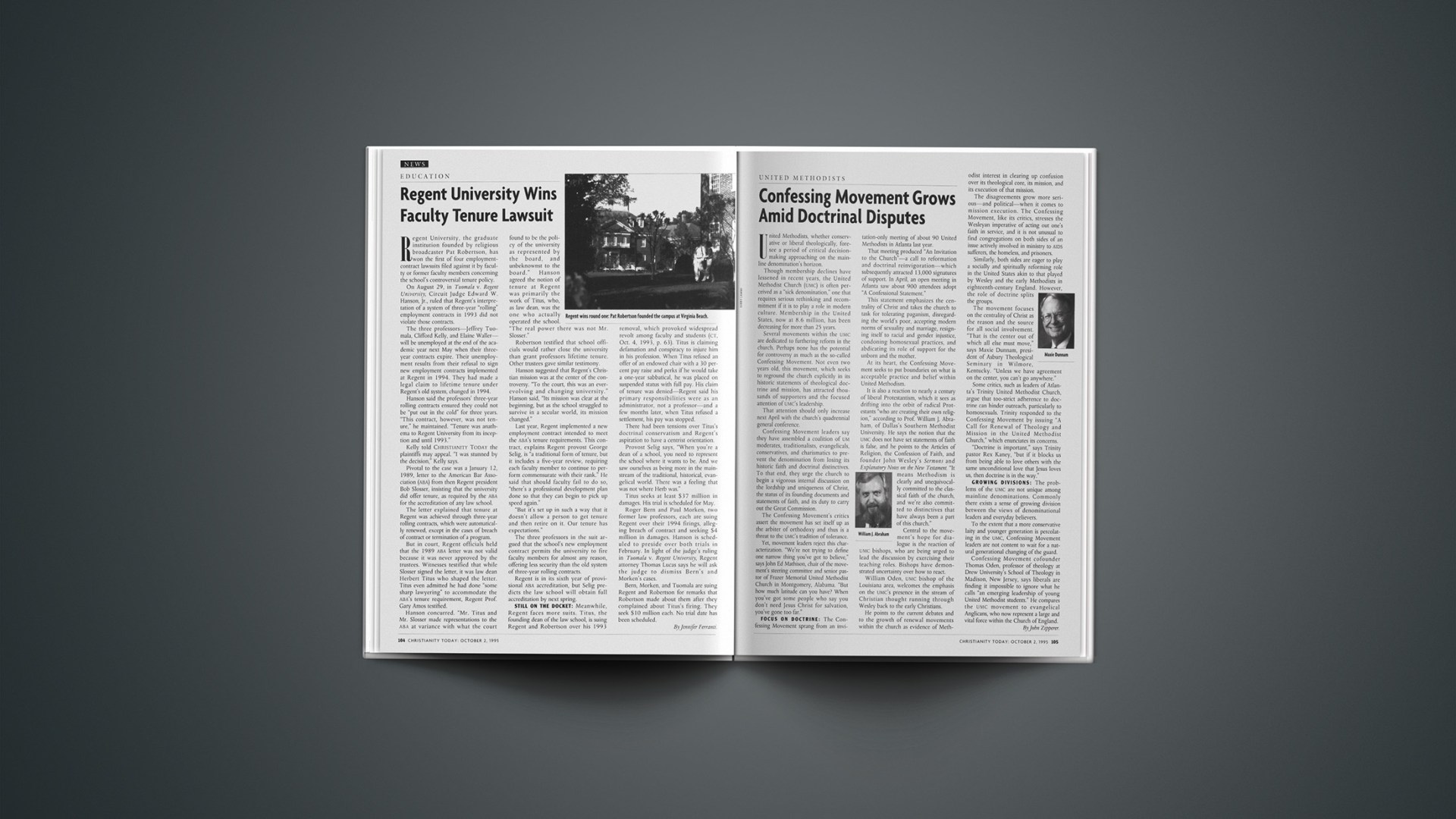United Methodists, whether conservative or liberal theologically, foresee a period of critical decision-making approaching on the mainline denomination’s horizon.
Though membership declines have lessened in recent years, the United Methodist Church (UMC) is often perceived as a “sick denomination,” one that requires serious rethinking and recommitment if it is to play a role in modern culture. Membership in the United States, now at 8.6 million, has been decreasing for more than 25 years.
Several movements within the UMC are dedicated to furthering reform in the church. Perhaps none has the potential for controversy as much as the so-called Confessing Movement. Not even two years old, this movement, which seeks to reground the church explicitly in its historic statements of theological doctrine and mission, has attracted thousands of supporters and the focused attention of UMC’s leadership.
That attention should only increase next April with the church’s quadrennial general conference.
Confessing Movement leaders say they have assembled a coalition of UM moderates, traditionalists, evangelicals, conservatives, and charismatics to prevent the denomination from losing its historic faith and doctrinal distinctives. To that end, they urge the church to begin a vigorous internal discussion on the lordship and uniqueness of Christ, the status of its founding documents and statements of faith, and its duty to carry out the Great Commission.
The Confessing Movement’s critics assert the movement has set itself up as the arbiter of orthodoxy and thus is a threat to the UMC’s tradition of tolerance.
Yet, movement leaders reject this characterization. “We’re not trying to define one narrow thing you’ve got to believe,” says John Ed Mathison, chair of the movement’s steering committee and senior pastor of Frazer Memorial United Methodist Church in Montgomery, Alabama. “But how much latitude can you have? When you’ve got some people who say you don’t need Jesus Christ for salvation, you’ve gone too far.”
FOCUS ON DOCTRINE: The Confessing Movement sprang from an invitation-only meeting of about 90 United Methodists in Atlanta last year.
That meeting produced “An Invitation to the Church”—a call to reformation and doctrinal reinvigoration—which subsequently attracted 13,000 signatures of support. In April, an open meeting in Atlanta saw about 900 attendees adopt “A Confessional Statement.”
This statement emphasizes the centrality of Christ and takes the church to task for tolerating paganism, disregarding the world’s poor, accepting modern norms of sexuality and marriage, resigning itself to racial and gender injustice, condoning homosexual practices, and abdicating its role of support for the unborn and the mother.
At its heart, the Confessing Movement seeks to put boundaries on what is acceptable practice and belief within United Methodism.
It is also a reaction to nearly a century of liberal Protestantism, which it sees as drifting into the orbit of radical Protestants “who are creating their own religion,” according to Prof. William J. Abraham, of Dallas’s Southern Methodist University. He says the notion that the UMC does not have set statements of faith is false, and he points to the Articles of Religion, the Confession of Faith, and founder John Wesley’s Sermons and Explanatory Notes on the New Testament. “It means Methodism is clearly and unequivocally committed to the classical faith of the church, and we’re also committed to distinctives that have always been a part of this church.”
Central to the movement’s hope for dialogue is the reaction of UMC bishops, who are being urged to lead the discussion by exercising their teaching roles. Bishops have demonstrated uncertainty over how to react.
William Oden, UMC bishop of the Louisiana area, welcomes the emphasis on the UMC’s presence in the stream of Christian thought running through Wesley back to the early Christians.
He points to the current debates and to the growth of renewal movements within the church as evidence of Methodist interest in clearing up confusion over its theological core, its mission, and its execution of that mission.
The disagreements grow more serious—and political—when it comes to mission execution. The Confessing Movement, like its critics, stresses the Wesleyan imperative of acting out one’s faith in service, and it is not unusual to find congregations on both sides of an issue actively involved in ministry to aids sufferers, the homeless, and prisoners.
Similarly, both sides are eager to play a socially and spiritually reforming role in the United States akin to that played by Wesley and the early Methodists in eighteenth-century England. However, the role of doctrine splits the groups.
The movement focuses on the centrality of Christ as the reason and the source for all social involvement. “That is the center out of which all else must move,” says Maxie Dunnam, president of Asbury Theological Seminary in Wilmore, Kentucky. “Unless we have agreement on the center, you can’t go anywhere.”
Some critics, such as leaders of Atlanta’s Trinity United Methodist Church, argue that too-strict adherence to doctrine can hinder outreach, particularly to homosexuals. Trinity responded to the Confessing Movement by issuing “A Call for Renewal of Theology and Mission in the United Methodist Church,” which enunciates its concerns.
“Doctrine is important,” says Trinity pastor Rex Kaney, “but if it blocks us from being able to love others with the same unconditional love that Jesus loves us, then doctrine is in the way.”
GROWING DIVISIONS: The problems of the UMC are not unique among mainline denominations. Commonly there exists a sense of growing division between the views of denominational leaders and everyday believers.
To the extent that a more conservative laity and younger generation is percolating in the UMC, Confessing Movement leaders are not content to wait for a natural generational changing of the guard.
Confessing Movement cofounder Thomas Oden, professor of theology at Drew University’s School of Theology in Madison, New Jersey, says liberals are finding it impossible to ignore what he calls “an emerging leadership of young United Methodist students.” He compares the UMC movement to evangelical Anglicans, who now represent a large and vital force within the Church of England.
Copyright © 1995 Christianity Today. Click for reprint information.
ctcurrmrw5TB1055919









